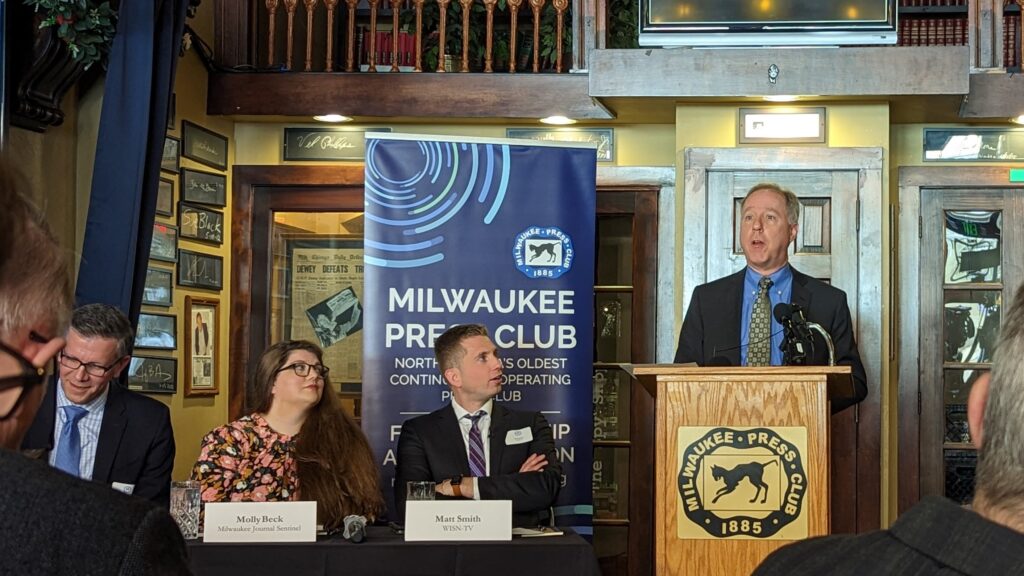Is Vos Allowing ‘Bipartisan’ Compromise?
Budget and shared revenue bills don't quite match vision articulated by Assembly Speaker.

Assembly Speaker Robin Vos spoke about compromise during a recent event hosted by the Milwaukee Press Club. Photo by Baylor Spears/Wisconsin Examiner.
Assembly Speaker Robin Vos (R-Rochester) said the “disappointing” results of Wisconsin’s 2022 elections — where Democratic Gov. Tony Evers won reelection by a healthy margin and Republicans held onto their majority in the state Legislature but fell short of a veto-proof supermajority — made him decide to hit the “reset button” in Wisconsin.
“Where we sit today is trying to figure out, how do we bridge that incredibly difficult divide and try to find answers that can solve the problem for the state?” Vos said at a recent Milwaukee Press Club event. “When we hit the reset button, we were sincere.”
As a sign of progress, Vos added that he’s met with Democratic Gov. Tony Evers more in the last three months than he did over the last three years.
This week the Assembly is expected to take up a shared revenue bill that has garnered a veto threat from Evers and the Joint Finance Committee resumes taking votes on the 2023-25 budget. Anthony Chergosky, a professor of political science at UW-La Crosse, says both issues are “huge tests” for Wisconsin state government and could give some indication of how Wisconsin leaders — including Vos — are approaching compromise and bipartisanship this session, especially as Republicans are adjusting to a new political reality in Wisconsin.
“In the aftermath of Gov. Evers getting reelected and in the aftermath of Janet Protasiewicz winning and flipping the majority of Wisconsin State Supreme Court, I was really wondering if the Republicans in the legislature would adopt maybe a different strategic approach,” Chergosky says. “I’m not really seeing that so far.”
Chergosky says the elections solidified the reality where the parties need to work together to get anything accomplished. Nevertheless, and despite the possibility that Republicans’ hold on the state Legislature could loosen if the state’s gerrymandered maps are redrawn, he says Republicans still seem “eager to play hardball with Gov. Evers, even though the political realities have shifted in the aftermath of the state Supreme Court election.”
Shared revenue: The first “bipartisan” negotiation
Shared revenue represents the first test of lawmakers’ newfound focus on compromise this session. Vos has said the resulting bill is something everyone can be proud of and described the process that led to it as a model for negotiations moving forward.
Vos touted Assembly Republicans’ legislation to boost local government funding as the “first bipartisan negotiation” of the session, saying Republicans, Democrats and local governments were all included in conversations about the bill. He said the GOP started in a “dramatically different” position than they ended, and that the same could be said for Democrats.
“It’s not exactly where everybody wanted, but I do think people in Wisconsin want us to be able to find middle ground and find consensus that moves the ball down the field,” Vos said at his Press Club visit, where he was questioned by a panel of reporters. “Maybe not as far as you’d like, maybe not in the exact direction that you want, but ultimately, making some progress to the state.”
Chergosky says the agreement that shared revenue is a problem that should be addressed is significant, but it doesn’t negate the significance of the ideological gap between the parties — making it difficult to craft policy.
“We’ve seen that the Republican proposal would really benefit smaller communities, and that is not surprising given the largely rural base that the party has,” Chergosky says. “To me the big questions with the shared revenue proposal have always been: How much money are we talking about, and what kinds of strings will be attached to the money? I think we’ve seen that the partisan interests of the parties are playing a huge role in how they answer those questions.”
The Republicans’ shared revenue bill (AB-245) starts with an idea supported by Republicans and Democrats: dedicating 20% of Wisconsin’s 5-cent sales tax to local government funding.
Despite the “bipartisan” nature of the proposal and the agreed source of funding, however, there are no Democratic co-authors, and Democrats have spent a considerable amount of time criticizing the bill since the draft was released. They have called on lawmakers to invest more money and for Republicans to remove a number of requirements that local governments would need to meet in order to receive the full funding.
Those limitations include prohibiting local municipalities or counties from holding advisory referenda, restricting local public health officials from issuing mandates to close a business for longer than 14 days in order to control an outbreak of a disease and requiring local governments to maintain a certain level of investment in public safety. This requirement would be met by meeting certain ticket or arrest quotas or not reducing police and fire budgets and staffing. There are also several provisions specifically for Milwaukee and Milwaukee County, which under the bill could adopt an additional sales tax to pay for unfunded pension obligations.
Republican lawmakers have said the provisions were included so the bill could get the votes on their side of the aisle that it needs to pass.
In the Assembly Local Government Committee Thursday, Democratic lawmakers tried to pass an amendment stripping the bill of the provisions unrelated to shared revenue. Rep. Samba Baldeh (D-Madison) said that would allow for bipartisan negotiations on the bill. Republicans on the committee rejected that characterization, insisting that Democrats were already involved throughout negotiations and would continue to be. After defeating the Democratic amendment, the Republicans passed the draft bill without any Democratic votes.
In his Press Club appearance, Vos said there was compromise on his part in that the bill “probably put more money into the system than I would have supported.” He didn’t note other specific compromises made by the majority party.
Republican leaders have said amendments to the bill will likely come to the floor this week. It remains to be seen whether those amendments will take into account feedback received from Evers, lawmakers, local government officials and members of the public over the last two weeks.
Republicans look to control the budget process
While shared revenue is inherently intertwined with the budget, the legislation is separate from the budget. Vos has said introducing packages separately was meant to stop Evers from changing the shared revenue bill by using his partial veto power.
“If you remember in the last cycle, we did the same thing where we did language in a trailer bill so that the governor doesn’t have a line-item veto…” Vos said at the Milwaukee event. “I imagine we’ll use a similar strategy, but my preference would be negotiating in good faith.”
The Republican-led Joint Finance Committee, as expected, started the budget process by removing 545 items from the executive budget proposed by Evers.
The move, which was heavily criticized by Democrats on the committee, who called on Republicans to debate the items included rather than throwing them out in one day, technically bars the items from being brought forth again during the process — unless a policy is introduced in a separate bill by a lawmaker who then brings a motion to JFC.
“Although the items on the list will not be included in the Committee’s budget deliberations, some of them might be addressed in non-budget legislation and could require language in the budget to carry out the intent of those acts,” stated a memo to JFC members. “The Committee will address those matters as necessary.’
A representative from Sen. Howard Marklein’s office said in an email that lawmakers are able to submit budget motions through the JFC process, and it is up to the co-chairs and the committee whether to act on them. This means that policy items previously included in the Evers budget could still be reintroduced.
For example, Evers proposed in his budget providing grants for suicide prevention to firearm retailers and ranges. The item was pulled from the budget and a similar bipartisan bill is now making its way through the legislative process. The Republican co-author said he plans to introduce a motion to JFC.
Chergosky said the tactic of proposing separate bills, rather than negotiating from what was proposed by Evers, is part of Republicans’ work to control the process and portray Evers as a “passive player.” He added claiming credit for policies is a huge issue because of the role it plays in campaigns.
“Republicans want to avoid the perception that the governor is in charge of the process,” Chergosky said. “They want to really promote the perception that they are in charge of the process.”
On issues where Evers has introduced proposals without first running it by the Legislature — such as his plan to dedicate $290 million to keep the Milwaukee Brewers in the city — Vos has said Evers’ leadership style makes it difficult to generate consensus. Evers’ plan was removed from the budget, with Republican leaders calling it “dead” and saying they would come up with their own plan.
Vos said the shared revenue bill is a first look at what compromise on other bills could look like. He said negotiations are happening on a “fairly substantive” affordable housing package, and that they will again have the opportunity to work with local government partners and people from across the aisle.
“My hope is it becomes a pattern that we follow where we find consensus on issues that are challenging and still try to find them on the ones that matter, won’t be on everything, but hopefully over time will be and a lot more than we have over time,” Vos said.
Vos didn’t provide details, but said that the idea for the affordable housing bill will be to incentivize local municipalities to relax certain building requirements that would increase the cost of a house.
“A lot of the things that add to the cost of the house don’t really achieve any public purpose other than someone who is sitting down and says ‘I think that’s nice’,” Vos said. “If it adds 20-30-40, $50,000 to the price of a home, that makes a lot of them out of touch and out of the ability for people to buy one, and I think that’s wrong. So what I’d like to do is again, not too mandate, but find ways to incentivize municipalities to say ‘It’s okay to not have sidewalks everywhere.’”
As negotiations on the budget and other bills continue, Chergosky says it will also be important to watch how Evers uses his veto power and what Republicans look to include in the budget bill that is sent to the governor to sign.
“The Republicans are going to use their power on the [JFC] to try to pursue some conservative policy goals,” Chergosky said. “The pivotal strategic question is, what do Republicans think Evers will accept?”
Budget, shared revenue bill test Assembly Speaker Vos’ vision of bipartisan compromise was originally published by the Wisconsin Examiner.





















we need fair maps. democrats are not being fairly represented in Madison.